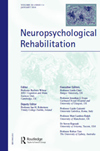Neuropsychological Rehabilitation publishes human experimental and clinical research related to rehabilitation, recovery of function, and brain plasticity. The journal is aimed at clinicians who wish to inform their practice in the light of the latest scientific research; at researchers in neurorehabilitation; and finally at researchers in cognitive neuroscience and related fields interested in the mechanisms of recovery and rehabilitation. Papers on neuropsychological assessment will be considered, and special topic reviews (2500-5000 words) addressing specific key questions in rehabilitation, recovery and brain plasticity will also be welcomed. The latter will enter a fast-track refereeing process.
《神经心理康复》发表与康复、功能恢复和大脑可塑性有关的人类实验和临床研究。该杂志是针对临床医生谁希望通知他们的做法在最新的科学研究;神经康复研究者的演讲最后是认知神经科学和对恢复和康复机制感兴趣的相关领域的研究人员。将考虑神经心理学评估方面的论文,也欢迎针对康复、恢复和大脑可塑性方面的具体关键问题进行专题评论(2500 - 5000字)。后者将进入快速通道裁判程序。
A systematic review of recommended modifications of CBT for people with cognitive impairments following brain injury
来源期刊:Neuropsychological RehabilitationDOI:10.1080/09602011.2016.1258367
Return to work after mild-to-moderate stroke: work satisfaction and predictive factors
来源期刊:Neuropsychological RehabilitationDOI:10.1080/09602011.2017.1313746
Outcome instruments in moderate-to-severe adult traumatic brain injury: recommendations for use in psychosocial research
来源期刊:Neuropsychological RehabilitationDOI:10.1080/09602011.2017.1339616
Cognitive behavioural therapy for post-stroke fatigue and sleep disturbance: a pilot randomised controlled trial with blind assessment
来源期刊:Neuropsychological RehabilitationDOI:10.1080/09602011.2017.1326945
Using real-time fMRI neurofeedback to restore right occipital cortex activity in patients with left visuo-spatial neglect: proof-of-principle and preliminary results
来源期刊:Neuropsychological RehabilitationDOI:10.1080/09602011.2017.1301262
Effectiveness of cognitive rehabilitation for people with multiple sclerosis: a meta-synthesis of patient perspectives
来源期刊:Neuropsychological RehabilitationDOI:10.1080/09602011.2017.1309323
Efficacy of home-based visuomotor feedback training in stroke patients with chronic hemispatial neglect
来源期刊:Neuropsychological RehabilitationDOI:10.1080/09602011.2016.1273119
The lived experience of behaviours of concern: A qualitative study of men with traumatic brain injury
来源期刊:Neuropsychological RehabilitationDOI:10.1080/09602011.2017.1307767
Theory of mind plasticity in aging: The role of baseline, verbal knowledge, and executive functions
来源期刊:Neuropsychological RehabilitationDOI:10.1080/09602011.2017.1308871
Using Virtual Reality to investigate multitasking ability in individuals with frontal lobe lesions
来源期刊:Neuropsychological RehabilitationDOI:10.1080/09602011.2017.1330695
Effect of activity-based mirror therapy on lower limb motor-recovery and gait in stroke: A randomised controlled trial
来源期刊:Neuropsychological RehabilitationDOI:10.1080/09602011.2017.1377087
The use of a smartwatch as a prompting device for people with acquired brain injury: a single case experimental design study
来源期刊:Neuropsychological RehabilitationDOI:10.1080/09602011.2017.1310658
Cognitive rehabilitation for individuals with opioid use disorder: A randomized controlled trial*
来源期刊:Neuropsychological RehabilitationDOI:10.1080/09602011.2017.1391103
Effectiveness of Communication-specific Coping Intervention for adults with traumatic brain injury: preliminary results
来源期刊:Neuropsychological RehabilitationDOI:10.1080/09602011.2016.1259114
Role of valued living and associations with functional outcome following traumatic brain injury
来源期刊:Neuropsychological RehabilitationDOI:10.1080/09602011.2017.1313745
Developmental prosopagnosia with concurrent topographical difficulties: A case report and virtual reality training programme
来源期刊:Neuropsychological RehabilitationDOI:10.1080/09602011.2017.1409640
Nociception Coma Scale with personalized painful stimulation versus standard stimulus in non-communicative patients with disorders of consciousness
来源期刊:Neuropsychological RehabilitationDOI:10.1080/09602011.2019.1614464
The use of repetitive transcranial magnetic stimulation (rTMS) following traumatic brain injury (TBI): A scoping review.
来源期刊:Neuropsychological rehabilitationDOI:10.1080/09602011.2019.1706585
Constructing robust selves after brain injury: positive identity work among members of a female self-help group
来源期刊:Neuropsychological RehabilitationDOI:10.1080/09602011.2017.1308872
Coping strategies for developmental prosopagnosia
来源期刊:Neuropsychological RehabilitationDOI:10.1080/09602011.2019.1623824
Numerical Activities of Daily Living – Financial (NADL-F): A tool for the assessment of financial capacities‡
来源期刊:Neuropsychological RehabilitationDOI:10.1080/09602011.2017.1359188
Description of a multifaceted intervention programme for fatigue after acquired brain injury: a pilot study
来源期刊:Neuropsychological RehabilitationDOI:10.1080/09602011.2017.1344132
Exploring predictors of work competence in schizophrenia: The role of theory of mind
来源期刊:Neuropsychological RehabilitationDOI:10.1080/09602011.2017.1314217
Self-regulation upon return to driving after traumatic brain injury
来源期刊:Neuropsychological RehabilitationDOI:10.1080/09602011.2016.1261716
A qualitative investigation of sense of self and continuity in younger adults with stroke
来源期刊:Neuropsychological RehabilitationDOI:10.1080/09602011.2017.1292922
The Brentano Illusion Test (BRIT): An implicit task of perceptual processing for the assessment of visual field defects in neglect patients
来源期刊:Neuropsychological RehabilitationDOI:10.1080/09602011.2019.1655067
Evidence-based systematic review of cognitive rehabilitation, emotional, and family treatment studies for children with acquired brain injury literature: From 2006 to 2017
来源期刊:Neuropsychological RehabilitationDOI:10.1080/09602011.2019.1678490
We are not the same people we used to be: An exploration of family biographical narratives and identity change following traumatic brain injury
来源期刊:Neuropsychological RehabilitationDOI:10.1080/09602011.2017.1387577
The social consequences of stigma-related self-concealment after acquired brain injury
来源期刊:Neuropsychological RehabilitationDOI:10.1080/09602011.2017.1375416
Effect of conceptual and lexical errorless versus trial-and-error learning in amnestic mild cognitive impairment
来源期刊:Neuropsychological RehabilitationDOI:10.1080/09602011.2017.1361843
Detection of text-based social cues in adults with traumatic brain injury
来源期刊:Neuropsychological RehabilitationDOI:10.1080/09602011.2017.1333012
An initial investigation of the reliability and validity of the Compensatory Cognitive Strategies Scale
来源期刊:Neuropsychological RehabilitationDOI:10.1080/09602011.2017.1329154
An overview of outcome measures used in neuropsychological rehabilitation research on adults with acquired brain injury
来源期刊:Neuropsychological RehabilitationDOI:10.1080/09602011.2019.1589533
Factors associated with parental grief reaction following pediatric acquired brain injury
来源期刊:Neuropsychological RehabilitationDOI:10.1080/09602011.2019.1668280
Relationship continuity and person-centred care: An exploratory mixed-methods investigation of spousal partners’ responses to the challenging care needs of those with acquired brain injury
来源期刊:Neuropsychological RehabilitationDOI:10.1080/09602011.2019.1566078
Awareness of deficit following traumatic brain injury: A systematic review of current methods of assessment
来源期刊:Neuropsychological RehabilitationDOI:10.1080/09602011.2019.1680393
Goal reengagement is related to mental well-being, life satisfaction and acceptance in people with an acquired brain injury
来源期刊:Neuropsychological RehabilitationDOI:10.1080/09602011.2019.1608265
Selective reminding of prospective memory in Multiple Sclerosis
来源期刊:Neuropsychological RehabilitationDOI:10.1080/09602011.2017.1313747
Positive behaviour support for challenging behaviour after acquired brain injury: An introduction to PBS\u2009+\u2009PLUS and three case studies
来源期刊:Neuropsychological RehabilitationDOI:10.1080/09602011.2019.1656647
Cognitive, physical, and psychological benefits of yoga for acquired brain injuries: A systematic review of recent findings
来源期刊:Neuropsychological RehabilitationDOI:10.1080/09602011.2019.1583114
Effects of a behaviour management technique for nursing staff on behavioural problems after acquired brain injury
来源期刊:Neuropsychological RehabilitationDOI:10.1080/09602011.2017.1313166
A changed reality: Experience of an acceptance and commitment therapy (ACT) group after stroke
来源期刊:Neuropsychological RehabilitationDOI:10.1080/09602011.2019.1589531
Behavioural activation therapy to improve participation in adults with depression following brain injury: A single-case experimental design study.
来源期刊:Neuropsychological rehabilitationDOI:10.1080/09602011.2019.1696212
The weekly calendar planning activity in multiple sclerosis: A top-down assessment of executive functions
来源期刊:Neuropsychological RehabilitationDOI:10.1080/09602011.2019.1584573
A metacognitive intervention model to promote independence among individuals with autism spectrum disorder: Implementation on a shopping task in the community.
来源期刊:Neuropsychological rehabilitationDOI:10.1080/09602011.2019.1682621
Technology-based interventions for mental health support after stroke: A systematic review of their acceptability and feasibility.
来源期刊:Neuropsychological rehabilitationDOI:10.1080/09602011.2019.1701501
Evaluation of a computer-based prompting intervention to improve essay writing in undergraduates with cognitive impairment after acquired brain injury
来源期刊:Neuropsychological RehabilitationDOI:10.1080/09602011.2017.1383272
Providing on-line support to families of people with brain injury and challenging behaviour: A feasibility study.
来源期刊:Neuropsychological rehabilitationDOI:10.1080/09602011.2019.1696846
A pilot and feasibility study of the effectiveness of care mapping on person-centred care in neurorehabilitation settings
来源期刊:Neuropsychological RehabilitationDOI:10.1080/09602011.2019.1598446
Do stroke survivors agree with their clinicians on the extent of their post-stroke activity limitation and participation restriction?
来源期刊:Neuropsychological RehabilitationDOI:10.1080/09602011.2019.1586734




